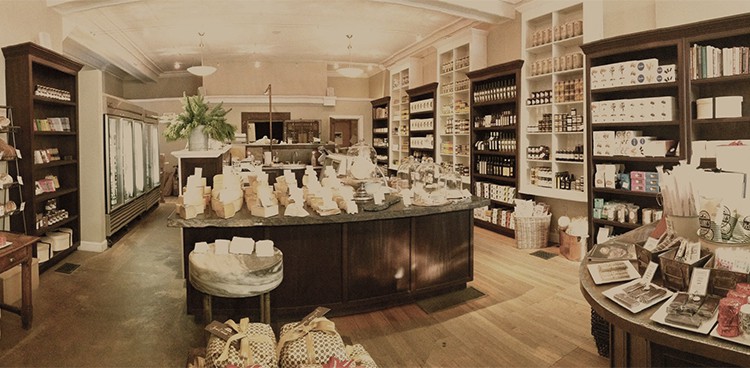
It is my duty as a cheesemonger to protect my beloved trade from those who would enter it willy-nilly, without sufficient preparation or a clear understanding of its rigors. Be warned: operating a reputable cheese shop is serious business. It is not for dabblers and dilettantes seduced by its glamour and romance. Anyone can open a cheese shop. There are no certifications required or guilds to join; just select a location, raise some money, and open a shop.
We opened ours five years ago in the small Massachusetts town of Great Barrington, ignoring the vigorous protests of our sales projections, which argued strongly for a more populated area. This was our second try in the Berkshires. Our first was a few miles north, in the even smaller, virtually customer-free town of Richmond. The Boston Globe called our store “the Brigadoon of country cheese shops.” But like the mythical village, it soon vanished, so we headed south. Our meager finances should have dictated a small, simple space—a refrigerated case or two, a sink, and a few tools. But our cheeses demanded a grander stage: an old pillared bank, paneled in mahogany and clad in copper. We also suspected that our cheeses would need a strong supporting cast of meats, pâtés, pastas, chocolates, and olive oils to generate the revenue that cheese alone could not. We added a café in hopes of enabling enough local coffee addiction to further assure our solvency.
The whole thing cost about $350,000, including $50,000 or so in dangerously perishable inventory. We had no money. Nor were we in a position to borrow much, even in those heady days of free-flowing capital. We elected, therefore, to use other people’s money, and happily gathered sufficient investment from supporters of various degrees of foolhardiness. Finally, after eight months of lease negotiations and six of construction, Rubiner’s Cheesemongers & Grocers opened for business.
The basic mechanical skills of cheesemongering are easier to attain. Knives, wires, guillotines, lyres, irons, and other cutting tools can be mastered fairly quickly. Proper wrapping technique, an art too often overlooked, can be achieved with practice and discipline. Reckoning weight is largely just a matter of confidence. Even sourcing and procuring cheese, at least on a basic level, can be learned from books, at trade shows, and by keeping a close eye on the competition.
But opening a cheese shop and learning a few mechanical skills does not necessarily make you a cheesemonger. Only years of study and toil will make you a cheesemonger. Only apprenticeships with masters and years of labor in caves, turning Cheddars and Salers, triaging Camemberts and Epoisses, and brushing mites from Stiltons and molds from Gruyères will earn you that title. Not until you can coax a cheese to ripe perfection and know exactly when you’ve gotten there will you wear that mantle. And then, finally, when you can weave everything you know about a cheese—its history, its place, its tradition, the craftsmen, the milk, the animals, the science—into a tale to charm your customer, will you really cut it in the cheese trade.
Photo Credit: Rubiner’s Cheesemongers & Grocers


